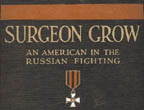

CHAPTER XVII
THE MEDAL OF ST. GEORGE
Back in the peaceful little village, with straw-thatched cabins, the sounds of the bitter fighting raging in the forest and swamps along the front came to us like distant thunder. The village was a perfect haven of rest to our fagged brains, worn almost to the breaking-point by the excitement and nervous strain of the past week.
The spring was just beginning to dispel the long stern winter and the smell of fresh earth and new budding life was in the air. The sound of running water told us that the iron fetters of the Frost King had been broken.
My hearing gradually came back and the noises in my head cleared up, but I was still nervous from the shock of the exploding shell.
One day Colonel Kalpaschnecoff came to me and with a twinkle in his brown eyes, said: "A personage, one of the Grand Dukes, is coming to our corps bearing the personal thanks of the Emperor to the soldiers and officers of the First Siberian Army Corps for their valiant efforts in the fighting of last week. I was ordered by General Pleschcoff to tell you that your presence would be required on the field when the troops are reviewed by His High Excellency, the Grand Duke."
"What has that got to do with me?" I asked in astonishment.
"I presume General Pleschcoff desires your presence to lend éclat to the occasion," he replied, smiling. "Anyway, be sure to be on hand, dress up in your best duds, and don't forget it's scheduled for the day after to-morrow at 2:30 P. M."
I went to the review and stood with the officers of the staff, and heard the High Personage speak a few words of praise to our men, who were drawn up in a great hollow square. The regiments were dwindled to a mere handful of their former numbers, and some companies had no officers at all to command the thirty or forty survivors---companies which had numbered two hundred men two weeks before.
Certain soldiers were called by name and stepped out of line, advanced to the center of the field, and stood at attention before the Personage.
Medals and crosses, dangling from ribbons of orange and black, were pinned to their left breasts over the heart.
More kind words were spoken by the Personage and General Pleschcoff, and then the soldiers saluted, wheeled, and marched stiffly back into the ranks.
Certain officers were then called by name and stepped into the field, where little white' crosses suspended from orange and black ribbons were similarly pinned to their breasts.
Among the names called was a strangely foreign one and I felt the Colonel push me forward and say: "Hurry! That's you I Don't forget to salute with the right hand!"
So I walked out and stood at attention and the Personage smiled and said:
"Malcom Alvaovitch Grow, you have been mentioned by the commander of the first division in despatches to our Emperor. These despatches told how you stuck to your post through most trying circumstances, caring for our wounded Russians, although warned by Colonel Starik to retire, and how you set for your orderlies and for our soldiers an example of devotion to duty and bravery. For this the Emperor desires that I thank you and present to you the medal of St. George."
Then he pinned the medal on my left breast and kissed me on both cheeks, as did General Pleschcoff .
I was too astonished to struggle, as would have become a true American, and I don't remember saluting, but the Colonel told me afterward that I did. As I walked off the field I heard dimly a roaring sound which I took to be the cheering of a large number of men, but I am not sure, for my hearing had not quite returned.
When I got back to where the officers were grouped I had to endure some more kissing by various bearded individuals.
A few days later Colonel Kalpaschnecoff asked me if I would like to go to America for a short leave of absence.
"You have been pretty well knocked about by !hat shell," he argued, "and the muddy season is at hand. The corps has lost half its men and won't be able to fight again for at least two months. We'll stay in reserve, filling up the gaps in the ranks for that length of time anyway, and I see no reason why you should not go."
I didn't either, and I hastily packed up and started for Petrograd.
I left our village at ten o'clock at night, riding the twenty versts to the station on horseback and there collecting my luggage which had been sent ahead by cart.
The Easter holidays were approaching and the trains were crowded with officers going home to celebrate the greatest of Russian holidays with their friends and families.
Many soldiers had also been given a furlough, and the third and fourth class waiting-room was crowded with soldiers sleeping on the floor and packed so tightly that one could scarcely walk. The first and second class waiting-room was nearly as congested, although the officers did not sleep on the floors.
The train was so crowded that we had to stand in the aisles. I stood for seventeen hours in all, sleeping part of the time as I stood. After a journey of several days, during part of which, of course, I managed to get a seat, I finally came to Petrograd. There I had to wait eight days before I succeeded in getting permission to leave the country. My trip through Finland, Norway and Sweden to Christiana where I took passage for America was without special incident.
I spent three delightful weeks in my own country and returned to Russia via Archangel, arriving at that port in early June, 1916.
Chapter Eighteen: A demonstration attack.